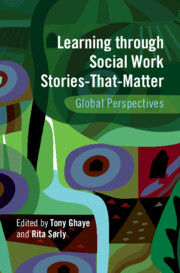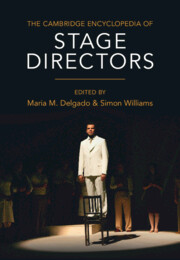Refine search
Actions for selected content:
243 results
Chapter 3 - Seeing and Speaking in Pericles
-
- Book:
- Voice and Ethics in Shakespeare's Late Plays
- Published online:
- 03 December 2025
- Print publication:
- 08 January 2026, pp 95-127
-
- Chapter
- Export citation
Chapter 1 - Bodies and Voices in Coriolanus
-
- Book:
- Voice and Ethics in Shakespeare's Late Plays
- Published online:
- 03 December 2025
- Print publication:
- 08 January 2026, pp 26-55
-
- Chapter
- Export citation
Chapter 5 - Voicing Authority in The Tempest
-
- Book:
- Voice and Ethics in Shakespeare's Late Plays
- Published online:
- 03 December 2025
- Print publication:
- 08 January 2026, pp 157-204
-
- Chapter
- Export citation
5 - The Many-Voiced Charles Harpur
-
-
- Book:
- The Cambridge History of Australian Poetry
- Published online:
- 19 November 2025
- Print publication:
- 11 December 2025, pp 100-117
-
- Chapter
- Export citation
6 - Narrative voice
-
- Book:
- The Prompts You Need to Help You Write the Book You Want to Write
- Published online:
- 25 October 2025
- Print publication:
- 06 November 2025, pp 76-83
-
- Chapter
- Export citation
13 - Developments in the Passive Construction
- from Part II - Tracking Change in the History of English
-
-
- Book:
- The New Cambridge History of the English Language
- Published online:
- 23 October 2025
- Print publication:
- 23 October 2025, pp 360-390
-
- Chapter
- Export citation
Chapter 6 - The Bilingual Discourse of History
-
- Book:
- Bilingual Academic Language
- Published online:
- 12 December 2025
- Print publication:
- 16 October 2025, pp 119-143
-
- Chapter
- Export citation
Chapter 7 - Michael Field and Lyric
- from Part II - Forms and Genres
-
-
- Book:
- Michael Field in Context
- Published online:
- 03 October 2025
- Print publication:
- 25 September 2025, pp 59-67
-
- Chapter
- Export citation
Reassessing the areality of sociative causative markers: A South American feature
-
- Journal:
- Journal of Linguistic Geography / Volume 13 / Issue 1 / April 2025
- Published online by Cambridge University Press:
- 08 September 2025, pp. 33-44
-
- Article
-
- You have access
- Open access
- HTML
- Export citation
Voice as objective biomarker of stress: association of speech features and cortisol
-
- Journal:
- Acta Neuropsychiatrica / Volume 37 / 2025
- Published online by Cambridge University Press:
- 03 September 2025, e84
-
- Article
-
- You have access
- Open access
- HTML
- Export citation

Learning through Social Work Stories-That-Matter
- Global Perspectives
-
- Published online:
- 28 August 2025
- Print publication:
- 11 September 2025
Chapter 5 - Learning in drama
- from Part 2 - What: the arts learning areas
-
- Book:
- Teaching the Arts
- Published online:
- 28 July 2025
- Print publication:
- 06 August 2025, pp 130-171
-
- Chapter
- Export citation
Laryngeal dysplasia: relationship between anterior commissure involvement and progression to invasive cancer
-
- Journal:
- The Journal of Laryngology & Otology / Volume 139 / Issue 10 / October 2025
- Published online by Cambridge University Press:
- 01 August 2025, pp. 923-927
- Print publication:
- October 2025
-
- Article
- Export citation
Exit as Voice: Implications of Russia’s War for the Understanding of Dissent under Authoritarianism
-
- Journal:
- Perspectives on Politics , First View
- Published online by Cambridge University Press:
- 26 June 2025, pp. 1-16
-
- Article
- Export citation
6 - Morphology and Morphosyntax: The Fate of Inflection and the Formation of Paradigms
-
- Book:
- The Balkan Languages
- Published online:
- 31 May 2025
- Print publication:
- 26 June 2025, pp 495-780
-
- Chapter
-
- You have access
- Open access
- HTML
- Export citation

The Cambridge Encyclopedia of Stage Directors
-
- Published online:
- 19 June 2025
- Print publication:
- 03 July 2025
Recurrent respiratory papillomatosis in children: coblation versus microdebrider
-
- Journal:
- The Journal of Laryngology & Otology / Volume 139 / Issue 9 / September 2025
- Published online by Cambridge University Press:
- 16 June 2025, pp. 834-837
- Print publication:
- September 2025
-
- Article
- Export citation
Chapter 5 - John Gower’s Visio Anglie
- from Part II - Becoming the Exile
-
- Book:
- Medieval Responses to Ovid's Exile
- Published online:
- 27 May 2025
- Print publication:
- 12 June 2025, pp 148-176
-
- Chapter
- Export citation
Chapter 4 - Becoming the Exile
- from Part II - Becoming the Exile
-
- Book:
- Medieval Responses to Ovid's Exile
- Published online:
- 27 May 2025
- Print publication:
- 12 June 2025, pp 125-147
-
- Chapter
- Export citation
Chapter 6 - Geoffrey Chaucer’s Exilic Voice
- from Part II - Becoming the Exile
-
- Book:
- Medieval Responses to Ovid's Exile
- Published online:
- 27 May 2025
- Print publication:
- 12 June 2025, pp 177-209
-
- Chapter
- Export citation
